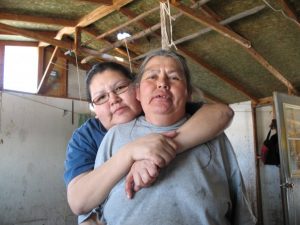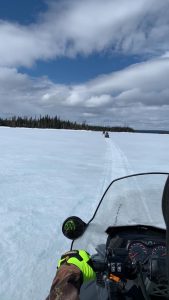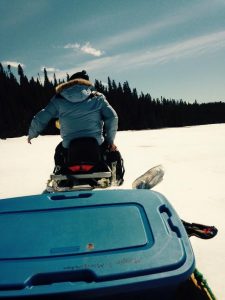Speech-to-text note on my iPhone:
I’m going to tell a story about the time I went ice fishing in Mississippi which is Indy area of northern Quebec I want slipped up there as a teacher for number of years and made good friends with The people in it one day my friend Maggie told me that they were going ice fishing and I really wanted to go and so I had a few spares that day around the lunch hour and I said you know what might work come pick me up at 10 as long as I’m back at school by noon I’ll be up I won’t miss anything and so sure enough she was there in her 4 x 4 Ford pick up at 10 AM to pick me up and I dashed out without anyone seeing me him and I have worn my two winter coats and prepared because she had said it was going to be very cold air so we went to the beach where her parents cabins was sent they looked at me and they said that’s all you have and I said well yeah I have to winter coats on I thought it would be warm enough they just looked at each other knowingly and then said oh Emily I think it’s better if you were this and handed me a huge down park and dad put it on over one of my other coats which was wall and what I thought was warm but anyway I trusted them for sure and so we loaded and we had t
 o ski dues with one person on each and then two sleds and I was in a sled with another person I am and to others were in the other side and it was so beautiful I was in the sled and we could smell the gasoline from the ski Doo but we were going through the forest over the lake and through other forests I would never have known which way to go the hunters that were driving the ski Doo us know exactly where they were going and it was magical this untouched winter landscape of Spruce trees and Tamarack trees and snow everywhere so we got to the lake and how we could see of a head that there wasMarking where we were going to fish so we were checking the traps that they had made and we went out for icefishing with a ride but rather we were pulling up the nets and it’s very challenging to do that because first of all the snow is about 4 feet high over the ice and the it’s covered by plywood where they they put the snow one so that it will freeze do you have to dig it up and then go to the plywood and takeoff the plywood in and pull up the net slowly because the fish could be it could still be alive if they can swim away if you’re able to maneuver out of it and so we had huge two huge blue Rubbermaid containers and we filled both of them with giant trout some of the biggest fish of ever seen and it was such hard work and to pull the birth of the net and then to put the net in water that had come from legs it was freezing cold so that the name that wouldn’t get tangled before it went back in the water and half of the little details of what they did or so fascinating LOL and looked so natural but we’re all done with such a purpose in and very precis
o ski dues with one person on each and then two sleds and I was in a sled with another person I am and to others were in the other side and it was so beautiful I was in the sled and we could smell the gasoline from the ski Doo but we were going through the forest over the lake and through other forests I would never have known which way to go the hunters that were driving the ski Doo us know exactly where they were going and it was magical this untouched winter landscape of Spruce trees and Tamarack trees and snow everywhere so we got to the lake and how we could see of a head that there wasMarking where we were going to fish so we were checking the traps that they had made and we went out for icefishing with a ride but rather we were pulling up the nets and it’s very challenging to do that because first of all the snow is about 4 feet high over the ice and the it’s covered by plywood where they they put the snow one so that it will freeze do you have to dig it up and then go to the plywood and takeoff the plywood in and pull up the net slowly because the fish could be it could still be alive if they can swim away if you’re able to maneuver out of it and so we had huge two huge blue Rubbermaid containers and we filled both of them with giant trout some of the biggest fish of ever seen and it was such hard work and to pull the birth of the net and then to put the net in water that had come from legs it was freezing cold so that the name that wouldn’t get tangled before it went back in the water and half of the little details of what they did or so fascinating LOL and looked so natural but we’re all done with such a purpose in and very precis
 ely dead as well so you know I watched it all but also helped as much as I could which was not very much but after we were finished pulling up the nets and then putting them back through and you you run it run a long rope along at the end of the net so that you can pull the net through with the rope so you have two huge ropes on either side of the net so that they can be put back in the water and her they let me do that perfect and cheered me on the invite in my small doing like they were a child because that is the way you learned from childhood by doing by watching it would take many many times for me to watch to really learn how to be as a skilled in the art of their icefishing and they’ve worked out their life to master the scale so after we finished with the fish and putting the nets back and covering up the holes with plywood and then putting snow on them we went to just kind of all stand around in a circle and and talk and even though they were all speaking Cree and I mostly didn’t understand the language there was a camaraderie peacefulness in the silence in the expression a feeling of success but also appreciation to the land to the animals to the world around them and as we wrote back there was a feeling of being whole being connected and really surrounded by nature and being provided for when we got back to the cabin the grandmother had a good come of the group been cooking for us I’ve been roasting a beaver and so after being out for about two hours or three hours in the cold cold day was probably between -20 and -30 that day go back to the warm lodge to warm up and we all a panic and the beaver she took the beaver off that was roasting her over the over the fire and cut it up and we all quietly sat around and ate and she thinks her sons for catching the fish and said a few words but I know they were very meaningful in their things and I knowl
ely dead as well so you know I watched it all but also helped as much as I could which was not very much but after we were finished pulling up the nets and then putting them back through and you you run it run a long rope along at the end of the net so that you can pull the net through with the rope so you have two huge ropes on either side of the net so that they can be put back in the water and her they let me do that perfect and cheered me on the invite in my small doing like they were a child because that is the way you learned from childhood by doing by watching it would take many many times for me to watch to really learn how to be as a skilled in the art of their icefishing and they’ve worked out their life to master the scale so after we finished with the fish and putting the nets back and covering up the holes with plywood and then putting snow on them we went to just kind of all stand around in a circle and and talk and even though they were all speaking Cree and I mostly didn’t understand the language there was a camaraderie peacefulness in the silence in the expression a feeling of success but also appreciation to the land to the animals to the world around them and as we wrote back there was a feeling of being whole being connected and really surrounded by nature and being provided for when we got back to the cabin the grandmother had a good come of the group been cooking for us I’ve been roasting a beaver and so after being out for about two hours or three hours in the cold cold day was probably between -20 and -30 that day go back to the warm lodge to warm up and we all a panic and the beaver she took the beaver off that was roasting her over the over the fire and cut it up and we all quietly sat around and ate and she thinks her sons for catching the fish and said a few words but I know they were very meaningful in their things and I knowl
 edge meant of the hunters work providing for their family and carrying on their traditions I don’t think i’ve ever had a better meal with the first time at a beaver and it tasted like the most delicious party food I could’ve ever imagined after a freezing cold day out on the lake aunt after we eat and we drink some tea we all went back into our separate ways and Hunter stay to clean the fish with their mother and I go back in the truck with Maggie give them back their coat and strong back to work and I had that walked right in Rita’s other people were coming back from lunch and I saidDid you have a good lunch and I replied yeah was better than usual the end
edge meant of the hunters work providing for their family and carrying on their traditions I don’t think i’ve ever had a better meal with the first time at a beaver and it tasted like the most delicious party food I could’ve ever imagined after a freezing cold day out on the lake aunt after we eat and we drink some tea we all went back into our separate ways and Hunter stay to clean the fish with their mother and I go back in the truck with Maggie give them back their coat and strong back to work and I had that walked right in Rita’s other people were coming back from lunch and I saidDid you have a good lunch and I replied yeah was better than usual the end
Analysis of Speech-to-text technology:
I was telling this story slowly and emphasized each moment and I recalled this adventure into the wilderness. For me, it was something completely new and in my story I am reflective and pay attention to details of the land, the process of ice fishing and to the atmosphere. During my story, I emphasized parts by speeding up to show excitement and spoke slowly at times, which is when the voice-to-text software would pause recording of the story. The software would occasionally stop recording while I would pause which led to missing words of my dictation or words joining together, such as “wasMarking.” The story is recorded as one long run on sentence as I did not pause to insert punctuation. Rather, I had natural pauses in my speaking and thought that it would be beneficial if the speech-to-text program could interpret these pauses as sentence breaks and insert periods appropriately.
The speech-to-text technology often correctly interpreted numbers and pronouns. However, there are mistakes, such as “-64” was said ‘-60 for’. The most common mistakes included nouns and adjectives, for example “Mississippi” was said as ‘Mistissini,’ “ski dues” as ‘skidoos.’ Adding words was also common when I may have mumbled or increased the tempo of my story, for example, “down park and dad” was said as ‘down parka and.’
I use this technology in teaching often, in my work privately as a tutor for a dyslexic girl, aged 12. I understand how best to use this, but deviated from the more ‘robotic’ or scripted speech in order to record as a story. As I have been learning to teach the use of speech-to-text technology, I made the same mistakes I often correct in my student, which is to ramble on in a story-like fashion. In my understanding of how the technology works, it will usually interpret and record the words with minimal flaws when speaking slowly and pronouncing each word carefully. However, when you start becoming more animated, by increasing the tempo or cadence of your speech, the software makes many more errors. In this passage, I can hardly interpret what the software recorded due to the change in my tone and speed as I watched the hunters reel in the fish. “to pull the birth of the net and then to put the net in water that had come from legs it was freezing cold so that the name that wouldn’t get tangled before it went back in the water and half of the little details of what they did or so fascinating LOL and looked so natural but we’re all done with such a purpose in and very precisely dead as well so you know.” In this passage, some of the key nouns and verbs were changed resulting in writing that has very little meaning. To me, I question what I was even saying and it feels like a guessing game of piecing together parts of the words, which also reminds me of marking some student’s essays. One guess would be that “lol” was ‘and it all.’ However, the variance in the way we write text messages as opposed to formal writing clearly influences this medium. If my student records a text similar to the one above, I recommend deleting it and starting over as it becomes much more confusing to interpret her own thoughts when recorded inaccurately. The method we use most often is to plan your ideas in advance, record one sentence at a time, and if possible, insert punctuation while recording the text.
Alternatively to storytelling, when recording something scripted, the author will work to clearly emphasize each word and maintain consistent tempo throughout each sentence despite encountering the challenge of speaking naturally. Storytelling, as a type of recording, would be better represented through a voice note rather than interpreted through speech-to-text. When storytelling, emotion and emphasis on certain words through inflection is natural, but not accurately recorded compared to a scripted speech, where the clear emphasis on each word provides a much different interpretation with the speech-to-text technology. However, a speech of this sort can often be monotonous compared to storytelling, where the listener is kept interested through the use of tones and speed to denote reflection, excitement or a dramatic pause. In reading a script, none of this is evident. This connects with the Shakespeare manuscript as compared to the recorded play. The conviction and emotional presentation from the actor allow the words to become feeling, invoke rhyme and passion in order to provoke a response in the listener.
The focus on writing in education for assessment has made students and teachers become more dependent on technology which enables students to develop literacy skills. Through word processing software of typing, spell-check, speech-to-text, writing has become more accessible, but also as the main method of conveying our understanding. In the age of abundance of information online, the focus on writing can take away from the development of identity, personal opinions and the ability for students to justify their beliefs. In my experience, students shy away from public speaking and discussion, in favour of text-based mediums. I am reflective on my teaching position as a humanities teacher, of how the “recording of words as reliable transmission of ideas and information” differs from explaining and conversing on challenging issues both past and present, and can obscure the learning objectives of understanding and internalizing multiple perspectives and world views in order to develop compassion and acceptance in students.